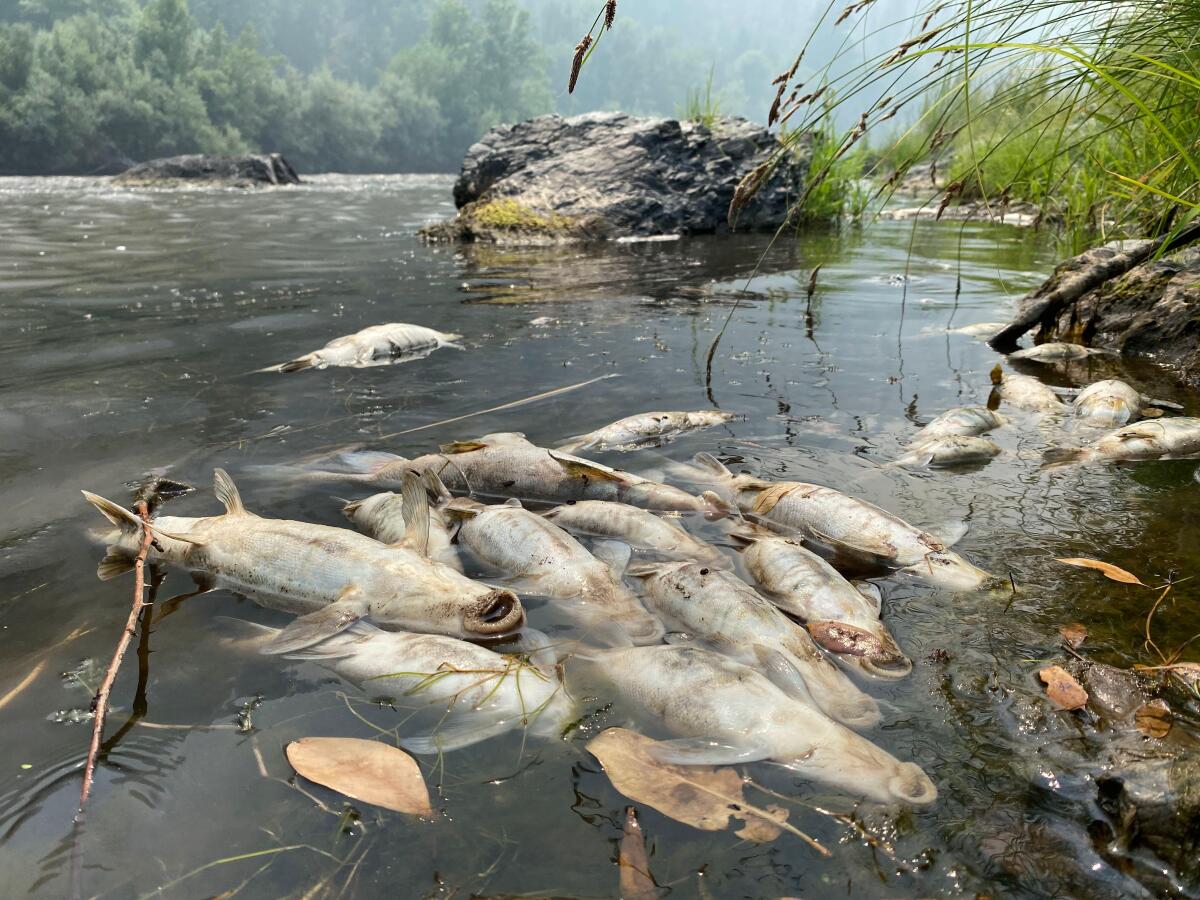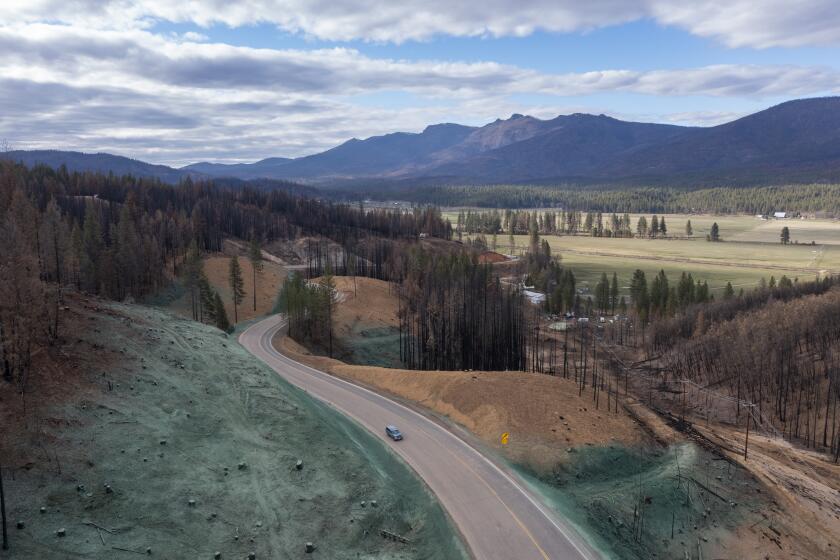McKinney fire landslide kills scores of fish in Klamath River

- Share via
A massive debris flow triggered by flash floods that followed a wildfire in Northern California is believed to have killed scores of fish along a 50-mile stretch of the Klamath River last week.
Intense storms sent floodwaters coursing through an area recently burned by the McKinney fire, pushing charred soil, rocks and trees into the river near Humbug Creek, said Craig Tucker, natural resources policy consultant for the Karuk Tribe. At least four deaths have been linked to the 60,000-acre fire, which is the largest to burn in California so far this year.
The debris flow was reported after up to three inches of rain fell on the east side of the fire Tuesday, Aug. 2, said Mike Lindbery, a public information officer on the fire.
A remote gauging system managed by the Karuk about 20 miles downstream, at Seiad Creek, found that the dissolved oxygen in the river plummeted to zero for about four hours Wednesday night, then again the following night, Tucker said. Dead fish started washing up farther downstream in Happy Camp that Thursday.
“It’s like dead bodies are floating to us out of the smoke,” he said.
Active fires — which include both the McKinney fire and the 8,000-acre Yeti fire — have precluded a full investigation, as virtually everything upstream of Happy Camp remains evacuated, Tucker said. But it seems likely the fish kill extended along 50 miles of river, he said.
“From about Humbug Creek all the way to Indian Creek, which is in Happy Camp, it was a kill zone those two days,” Tucker said. “It looks like probably everything in the river died.”
Species include juvenile chinook and coho salmon, as well as trout, Pacific lamprey, suckers, crayfish and various macroinvertebrates, he said.
Explosive growth of the deadly McKinney fire was driven by a perfect storm of extreme heat, dry vegetation, steep terrain and erratic winds.
The gauging system shows that oxygen levels have since improved, Tucker said. And since adult salmon are just now entering the river at the Pacific Ocean to swim upstream to spawn, they likely hadn’t yet made it to the area where the kill took place, he said.
“As bad as this is, we do feel like we dodged a bullet, because if this had happened at the end of August, it could devastate the adult fish migration,” he said.
At the same time, he said, suckers play a key role in river ecology, acting like vacuum cleaners to keep algae from growing out of control. It’s unclear what their demise across such a large stretch of river will mean for next year’s water quality.
Recently burned land is vulnerable to debris flows because there is less vegetation to absorb rain and hold the ground in place. Ash and other burned particles can also clog the soil, further compromising its ability to soak up water.
Research has suggested that land that burns at a high severity, in which most or all of the vegetation is killed, is even more susceptible to debris flows. That appears to be the case with the area where this flow took place — the fire was stoked by a buildup of flammable vegetation and burned intensely, Tucker said.
“To us, this just illustrates how important land management is to fisheries,” he said.
Indigenous people regularly applied fire to the landscape until the practice was criminalized, he said. Fire had consequently been excluded from this particular area for 70 years, since another wildfire burned through virtually the same footprint in the early 1950s.
Meanwhile, decades of commercial logging left swaths of the Klamath clear-cut and sprayed with herbicide to prevent hardwood growth and nurture dense plantations of Douglas fir and ponderosa pine, further compromising the forest’s diversity and resilience, Tucker said.
“You dump global warming on top of this, and these ecosystems are at a breaking point,” he said.
“That’s why we’re such advocates of prescribed burning,” he added. “Because what we’ve allowed is for the fuels to build up over all these decades. And when the fire hit, it just burned hot and out of control.”
An increase in catastrophic wildfires has reduced California tree cover by 6.7% since 1985, and researchers fear the lost trees will never grow back.
Tribes that call the Klamath Basin home, including the Karuk and the Yurok, also actively managed the land to support salmon populations using sophisticated techniques, Tucker said. They would strategically put smoke in the air in the fall, often during ceremonial events to welcome the fish, he said. The smoke shaded the water from the sun and caused river temperatures to drop, which in turn triggered the salmon to swim upstream to spawn, he said.
“Now, people are preparing to engage in tribal ceremonies to celebrate the return of the salmon and here we have these massive fish kills,” he said. “It’s hard to have a religious celebration when these horrible things are happening around you.”
The fish kill comes amid conversations among tribal leaders about how to mark the 20th anniversary of a 2002 fish kill in which up to 70,000 adult salmon died before spawning in the lower Klamath because of poor water quality and low flows, Tucker said. The tragedy galvanized tribes, conservation organizations and commercial fishermen to band together and demand the removal of four aging hydroelectric dams on the Klamath River that have lowered the river flow, warmed its waters and blocked migrating salmon.
Tucker calls the removal, which is expected to be greenlit by federal regulators by the end of the year, “the biggest salmon restoration project in history.” Local residents were ecstatic about the project moving forward, he said. And rain that fell in May meant that for the first time in several years, they were optimistic they would see a good survival rate of juvenile fish. That was until last week.
“We were hoping to celebrate,” he said. “This is a real setback to that.”
More to Read
Sign up for Essential California
The most important California stories and recommendations in your inbox every morning.
You may occasionally receive promotional content from the Los Angeles Times.
















